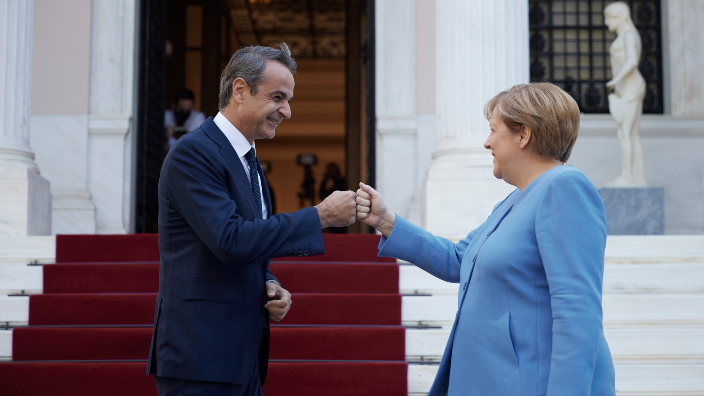Angela Merkel has completed her final trip as German chancellor to Greece, a country where she was not overly welcome in the past because of the strict austerity measures she backed to keep Greece’s economy afloat.
Sticks, stones, gas bombs and heated demonstrations gripped Greece on Merkel’s first visit to Athens in 2012.
But now, a decade later, the outgoing chancellor got an almost indifferent public reception, walking freely along streets bare of any public protest or threat.
During her visit, Merkel met with Greece’s President, Katerina Sakellaropoulou, and Prime Minister, Kyriakos Mitsotakis. She also visited the Goethe Institute of Athens.
Merkel admits being tough on Greeks:
In Merkel’s meeting with Mitsotakis, she referred to Greece’s 10-year financial crisis, saying she is aware of the burden that was borne by Greek citizens and that she “demanded a lot.”
“I was always in favour of Greece remaining in the eurozone and I said that the efficiency of our economic system must be comparable otherwise we would not be able to keep the common currency alive,” she said.
“I know that I demanded a lot from the Greeks but, on the other hand, there were various governments in Greece that considered many reforms possible.”
For his part, Mitsotakis, who is the eighth Greek Prime Minister to work with Merkel, said: “Merkel was the voice of reason and stability. Sometimes unfair, but decisive, as she was in 2015, when she rejected the expulsion of Greece from Europe.”
Turning to Greece’s relations with Turkey, Mitsotakis told Merkel: “I know your firm position in favour of dialogue and the easing of tensions.”

Merkel pointed out that Greece, due to its geopolitical position and proximity to Turkey, faced huge challenges at its external borders.
“One can learn and be taught many things by Greece and from one another and many discussions led to very good solutions,” she said.
“I cannot but agree that most of the problems between Greece and Turkey are EU-Turkey problems, and within the framework of the EU there is unity.”
Source: Ekathimerini.

